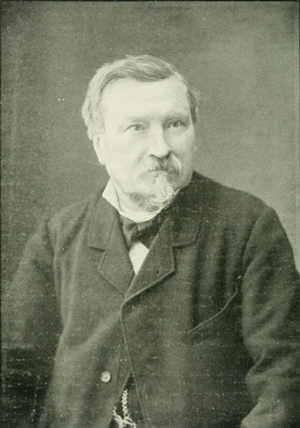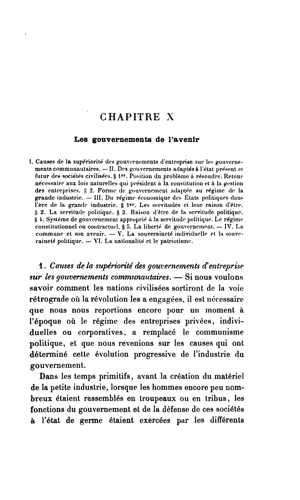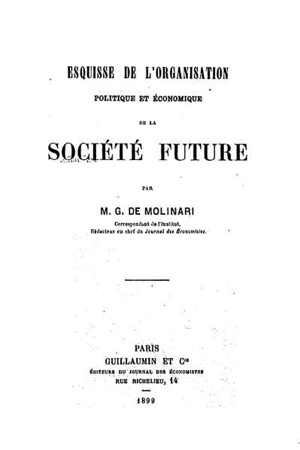
[Note: This post is part of a series on the History of the Classical Liberal Tradition]
One of the most radical visions of the future written by a radical liberal was that by the Belgian-French political economist Gustave de Molinari (1819-1912)). His conception of “the political and economic organisation of the society of the future” (the title of a book he wrote in 1899) [English HTML and Fr. HTML] was of radically decentralised organisations which would provide “government or security services” to “customers of security.” These would be provided by local municipal bodies, or by “proprietary communities” which would provide them for their members, or by private companies (probably insurance companies) which would charge their customers premiums to protect their life, liberty, and property.
He first put this idea forward in February 1849 in an article “La production de la sécurité” [Fr. HTML and facs. PDF; – English HTML] and later that year in a chapter of his book Les Soirées de la rue Saint-Lazare [whole book in Fr. HTML and facs. PDF; my revised trans. of chap. 11 English HTML], and then in much more detail in chapter X of his book L’évolution politique et la Révolution (Political Evolution and the Revolution) (1884) on “Les gouvernements de l’avenir” (Governments of the Future”.

This latter chapter has never been translated into English. Earlier this year I put online an HTML edition of of the entire book [Fr. HTML ] and facs. PDF] and its companion volume L’évolution économique du XIXe siècle: théorie du progrès (Economic Evolution in the 19th Century: A Theory of Progress) (1880) [Fr. [ HTML ] and [ facs. PDF ].].
I began doing a translation of this important chapter back in the summer of 1981 (northern hemisphere) when I was a graduate student at Stanford University but I never finished it unfortunately. I recently found my hand-written draft and scanned it.

It is 101 pages long and is a translation of the first 50 or so pages of the French original, pp. 351-399. I did not complete the rest, pp. 400-423, as the demands of graduate school increased and I put it aside. I have put it online for anyone who might be interested. [facs. PDF of my partial trans. and also just chap. X in French HTML and facs. PDF].
Two years before, when I was writing my Honours thesis at Macquarie University on Molinari, I included a translation of chap. 11 of Les Soirées as an appendix, which later appeared when the thesis was published as a series of articles in the Journal of Libertarian Studies (1981-82). I returned to Les Soirées as the editor and co-translator of the book which Liberty Fund planned to publish. The manuscript is finished but the project has been shelved as far as I can tell by the new regime. A draft (2016) of the translation is on the OLL website but I have no idea how long it will remain there or what will happen to it.

At the ripe old age of 80 he summarised his views of what the future might look like if his radical liberal reforms were to be introduced, in a book, Esquisse de l’organisation politique et économique de la Société future (A Sketch of the Political and Social Organisation of Society in the Future) (1899) [French HTML and facs. PDF] which was one of the very few of his many books to be translated into English – The Society of Tomorrow: A Forecast of its Political and Economic Organization (1904) [English HTML and facs. PDF].
Around the same time as his book “A Sketch of Society in the Future” appeared, in which he depicted what a society might look like if it continued to progress down the path of political liberty and competition in all things, he wrote a pair of articles to mark the turn of the century – one looking over the achievements of liberal reforms and their setbacks during the 19th century; and another looking into the rather bleak prospects of the coming 20th century. [“Le XIXe siècle”, Journal des Économistes, Janvier 1901, pp. 5-19 [facs. PDF and HTML] and “Le XXe siècle”, JDE, Janvier 1902, pp. 5-14 [facs. PDF and HTML].] He saw the future as one of the continued rise of socialism, protectionism, imperialism, war, and economic devastation, until such time, perhaps 70 or so years into the future, when people had come to their senses, realised the very great things a free society would allow people to achieve, and so resume the great liberal reform movement which had started in the late 18thC.
Further Reading
For a more detailed discussion of the development of Molinari’s ideas on what is now called “anarcho-capitalism” over the 50 years between 1849 and 1899, see my paper given at the Libertarian Scholars Conference in 2019 in NYC “Was Molinari a true Anarcho-Capitalist?: An Intellectual History of the Private and Competitive Production of Security” HTML.
On Molinari’s pessimistic views of the coming 20th century see a paper I gave at the Australian Historical Association 2000 Conference on “Futures in the Past” held at the University of Adelaide in 2000 to mark the turn of the new millennium: “Gustave de Molinari and the Future of Liberty: ‘Fin de Siècle, Fin de la Liberté’?”. HTML
On other CL visions of the future see this post: “Classical Liberal Visions of the Future I” (27 August, 2021).
